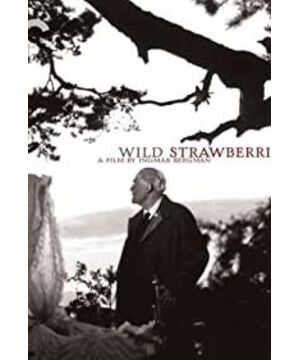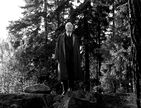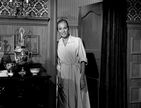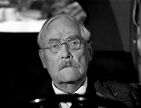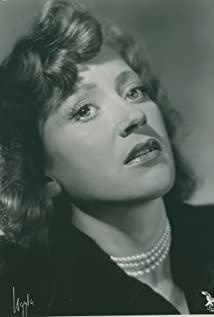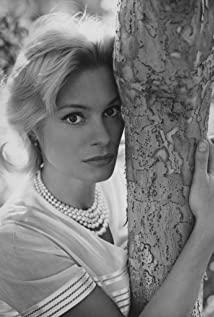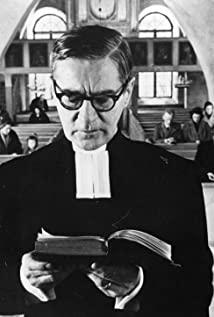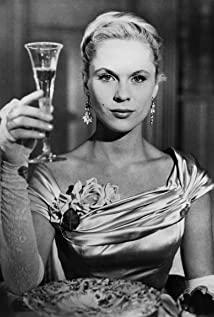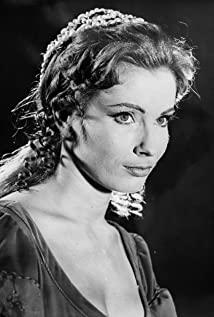[Coursework, some things should not be included in the film review, but I am too lazy to change it, so let's do it]
"Wild Strawberries" is the masterpiece of the world-famous Swedish film master Ingmar Bergman. Although regarded as the pioneering work of "stream-of-consciousness movies" (a scary term), it is actually full of various intentions and metaphors, but the viewing experience of "Wild Strawberries" does not make people feel too dazzling, so much Obscure and dull; on the contrary, Bergman's masterful expression of elusive and subtle themes of emotion, unconsciousness, dreams, and love makes it easy for audiences to engage in it, concerned with the fate of the characters and the development of the plot. . The aesthetic value and significance of this film in the history of film can be described, but it is not the focus of this article, so it is not listed here. Although this article focuses on the life story of the protagonist Isaac, we cannot completely ignore Bergman and other aspects of the film itself for two reasons: 1) Isaac is Bergman's own The virtual characters created by the writer and director are not real. If we completely ignore Bergman and talk about Isaac, this is an obvious "blindness" and a missing perspective; 2) The overall theme of the film Meaning and so on all determine what kind of side Isaac presents to us. If we ignore this background information, we will misunderstand his behavior. Therefore, where necessary, this article still cites information not directly related to Isaac to aid the analysis.
The stages of childhood and adolescence
In addition to the introduction of the plot at the beginning, the whole film of "Wild Strawberry" is divided into five obvious parts: dreamland-dreamland-reality-dreamland-reality (the short dream at the end is continuous with the theme of the last reality, so it is not separately divided out). Because Isaac's inner conflicts are shown through his memories of his old age, the whole film has only a few direct depictions of things before adulthood, but it can be inferred from details such as dialogue.
For pre-adult people, parents are undoubtedly the most important others. However, for Isaac, his father is an "unreal existence" - we can only infer his existence from other people's mouths and common sense, but in Isaac's spiritual world, it seems that we can't see his existence. to a position where there is such a person. He is completely absent, completely forgotten, even when we feel sympathy for Isaac and grieve for him, we notice his stone mother, repeated victim patterns, social role masks...etc. , but we also forgot about the father who was supposed to be there. It was not until the end of the film, when Isaac reconciled with himself with a smile, that we saw the far-off father in his heart who still couldn't see his face, and we suddenly realized that this was Isaac's real wish. What about the mother? Everyone who has seen this movie probably doesn't think his mother is a lovely person. Her bossy, stereotyped, uncomfortable way of talking about others makes it difficult to approach. Many interpretations say that Isaac's lack of ability to love and be loved, or that he has actually been avoiding love for a long time, is inherited from his mother. However, this claim, whether based on Erickson's theory or not, also seems somewhat arbitrary. We can see that Isaac's upbringing was deformed and lacking in love, but this is not explained by the absence of his father or the defect of his mother; , but the role of parents. According to Erickson, the tasks of one's childhood and adolescence can basically be reduced to exploring and forming a stable self. We don't know the details of Isaac's childhood and what exactly happened to him at what stage, but we can be sure that such exploration is based on the love and support of parents (carers) because Pre-adult people are necessarily dependent on caregivers to survive. In the absence of a solid fortress of safety and a safe haven—trustworthy caregivers and an atmosphere of love—as premise for exploration, we don’t need to get into the details to know that something will go wrong. So, can we say that Isaac suffers from low self-esteem because of a lack of industriousness, or a confusion of roles because of a lack of an identical self? I'm afraid it's a bit far-fetched to apply this. However, the emptiness and distortion in his family relationships that we can experience as we watch the film, as well as the loneliness and escapism from his life script, are evidence of his unresolved conflicts at this stage, as well as Became the backdrop for others' adulthood themes.
The stage of adulthood
Erickson divides the stages of adulthood into three stages: early, middle and late, which almost correspond to several segments: dream (late) - fantasy (early) - reality (middle) - dream (middle) - reality (late) . Below, this article will discuss Isaac's middle-aged life in the order of these three periods.
The film's approach to Isaac's early adulthood is brilliant. Throughout the story, he does not appear at the time, but the now elderly Isaac is placed in the position of a bystander to see things he didn't know when he was younger. In his vision, he sees what happened behind his one-time failed love, presented as the confession of his former love, Sarah. Sarah says he's "a nice guy, good character and sensitive...he's so high-level, I don't think I'm useful. Sometimes I think I'm a lot older than Isaac, and he's like a kid even though we're the same age." We can Seeing that Isaac masks rationality and his lover feels emotionally distant from him, his pattern of isolating himself with rationality is also evident. The illusion was interrupted here. Although we have no way of knowing the ending of the two for the time being, we can also speculate that it will not end happily. Erickson believes that the important task of early adulthood is to build intimacy through love and avoid loneliness, and while Isaac arrives with a childhood debt of love-deficit, his conflict resolution is clearly likely to fail. Bergman imprinted Isaac with loneliness very early on with his extraordinary performance skills, and in Erickson's view, loneliness comes with a debt of love and leaves with more debt, but kinks and loneliness. outbreaks in early adulthood. From this point of view, Bergman's arrangement of this fantasy at the earliest place in the film (except for the purely abstract dream) coincides with Erickson.
The two descriptions that deal with middle adulthood focus on Isaac's actual marriage. In reality, the uncomfortable way in which the couple they meet (Ellman and Beret) alludes to the strange relationship between Isaac and his wife (he later sees the "operating table" in a dream ” on Beritt also confirms this). In the second dream, Isaac first saw the breakup of his old lover with him and the happy scene with his brother Skyfrit, full of helplessness and powerlessness; then, he experienced a series of highly intentional confrontations. After examining and "judging" his failed marriage relationship and lonely life, he was finally able to face the climax of his failed marriage again in a dream - seeing his wife cheating with his own eyes. Here, too, the wife has a confession: "I went home and told Isaac, and I knew what he would say. 'Poor girl, I'm so sorry.' As if I were a fairy, I cried and said, 'You really are I'm sorry?' And he'd say, 'Yeah, I'm so sorry.' And I'd cry even harder and ask him to forgive me, and he'd say, 'You don't ask for my forgiveness, there's nothing to forgive.' But he Divided because he's ruthless like ice...he's sad and admits he's wrong, but he doesn't really care because he's so cold." Again, we feel their feelings from his partner's mouth estranged, even hopelessly aloof. Erickson said that during this period, a person should have children and care about the reproduction and nurture of his offspring in order to live a happy and fulfilling life; a person without a sense of fertility, whose personality is impoverished and stagnant, will become a self-conceited person. A person who only considers his own needs and interests, and does not care about the needs and interests of others. However, the sense of fertility has two meanings: birth and childbirth. Even if a person does not have children, as long as he can care for children and educate and guide them, he can have a sense of fertility. Fertility. Judging from his daughter-in-law Marian's selfish accusations in the car and his relationship with his son, Isaac really doesn't care much about his children emotionally. Of course, we should return to his recurring themes: the lack of love, rational defenses, and loneliness. Erickson also believes that various life stages are not isolated, but flow and influence each other; when some life themes run through a person's life, they will also have corresponding effects at each stage.
Unlike previous repetitions, Isaac's themes of late adulthood can be summed up as awareness and reconciliation. At the very beginning of the film, an extremely abstract dream set the tone of the whole film: a silent and monotonous street, a clock without hands, a stuck carriage, and myself in a coffin... On the one hand, loneliness, on the other hand, Awareness of loneliness. It can be said that it was this dream that triggered Isaac's desire to change to driving and revisit the old places, and it was also an expression of his unconscious urge to seek reconciliation. By the end of the film, the trip has given Isaac a new understanding of life. He apologized to the housekeeper, cared for his son, and showed kindness to his daughter-in-law; for the first time, before falling asleep for the last time, he was really happy when he was alone. In this briefest dream, he completed his reconciliation with himself: he returned to his childhood villa, the family was preparing to go to the opposite island on a speedboat, the atmosphere was happy and peaceful; Sarah was happy He took the initiative to greet him and took him to his parents. The previous embarrassment and tension between the two had disappeared; finally, he looked at the fishing parents from a distance, his brows were widened, and his eyes were full of affection, so that people could see him I am feeling the happiness of finally having no defense. Erickson believes that when old people look back on the past, they may say goodbye with fulfilling emotions, or they may die with despair. Self-adjustment is a feeling of accepting oneself and acknowledging reality, a sense of detachment. If one's self-adjustment is greater than despair, one acquires the quality of wisdom, which Erickson defines as "a detached approach to life and death." But here, Bergman's personal understanding is clearly different from Erickson's. In Bergman's view, detachment in old age is more like a state of letting go of reason, experiencing life, feeling happiness, and reconciling oneself; it is not a sublimation to another realm, but a return to the most authentic state, which is incompatible with his Personal experience matters. Bergman's father, a pastor, had a cold relationship with his parents, and his relationship with his father was particularly bad, so much so that he ran away from home at the age of 19. Bergman accepts serious concepts such as "guilt, repentance, punishment, concern" at home, but lacks the experience of love and passion. Therefore, we can say that a large part of the image of Dr. Isaac Berg (are Berg and Bergman somewhat similar?) is Bergman himself. Many people say that "Wild Strawberry" is Bergman's reconciliation work for himself. The picture in Isaac's last dream is also Bergman's inner vision, the spiritual world he reconstructed for himself. In fact, "Wild Strawberry" is also a turning point in Bergman's artistic career: the previous Bergman used the dramatic effect of the stage He is famous for his use in movies, and after "Wild Strawberry", he moved towards a more cinematic artistic direction, and the dramatic element gradually faded out. We have reason to believe that Isaac's reflection and transcendence of reason is indeed Bergman's personal wish to achieve through this film.
3. Summary
In the above discussion, we rarely touch on one of the film's most important intentions, the title itself - Wild Strawberry. Why did Bergman give it that name? What does this intention mean? In this regard, we can recall the important scenes in the movie where the wild strawberries appear:
1) Seeing the wild strawberry bushes outside the old residence, Isaac entered a fantasy world. In the fantasy, Isaac saw his old lover Sarah on this wild strawberry field, she was picking wild strawberries and preparing to give Uncle Aaron a birthday present. Then Skyfleet appears, and he boldly confesses to Sarah and kisses her, and the basket slips from Sarah's hands, and wild strawberries are scattered all over the floor.
2) The opening scene of the second dream is a close-up of the basket of wild strawberries. Strawberries were scattered all over the place, and we seemed to clearly observe the scene that flashed by in the fantasy, and then Sarah began to say hurtful things to Isaac.
3) In the last short dream, Sarah happily ran to Isaac and said to him "Isaac, the wild strawberries have been eaten".
It is not difficult to find that the image of wild strawberries always appears in the unreal world, and always appears with Sarah. On the one hand, the wild strawberry has the bright and ruddy color of the strawberry. A more obvious symbol is youth and the impulse of youth. For Isaac, it has become the symbol of his youth and the green feelings between him and Sarah. A symbol whose accumulation and dumping allude to the ebb and flow of both. On the other hand, wild strawberries are not as big and sweet as strawberries. They are small and underdeveloped, symbolizing the possibility of growth and development. For Isaac, this growth has never been realized, and the intention of wild strawberries has always existed. in his consciousness; he was not reconciled until finally the wild strawberries were "finished" and could be put down. It can be seen from this that "Wild Strawberry" is a symbol of Isaac's stunted development due to lack of love, and his unfulfilled wishes in his youth, and his intention to be stuck here all the time. It can be said to be the epitome of the characteristics of his life. In Erickson's language, his life is like an incomplete wild strawberry with many conflicts unresolved - but as long as you let go of the past, you can still find happiness.
View more about Wild Strawberries reviews


